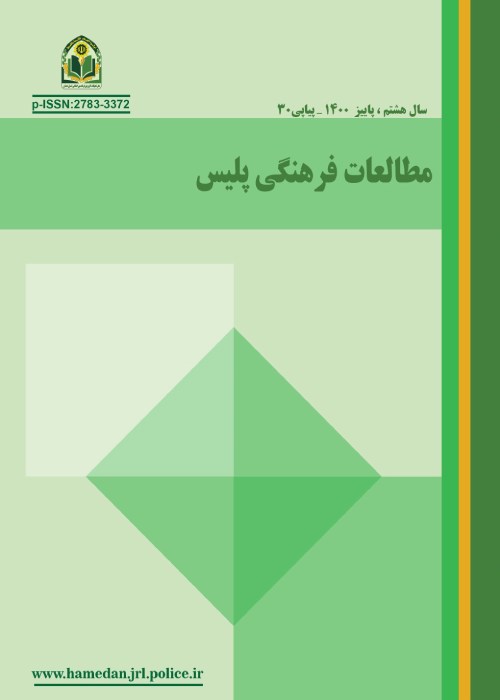Presenting the communal education model of the police within a ten-year time period
The aim of this research was to design a model to elucidate social damages and universal police education for families. This qualitative study follows the grounded theory methodology. Data were collected using semi-structured in-depth interviews. A purposive sampling technique, combined with snowball samplThe aim of this research was to present a model for communal police education over a ten-year time horizon. The present study utilized a qualitative approach and employed the grounded theory methodology. Data were collected through semi-structured in-depth interviews. Fifteen experts and professionals, including instructors of FARAJA universal education, FARAJA counselors and psychologists, and managers with a minimum level of experience in the design, planning, and education concerning social harms to citizens, were selected using theoretical sampling and the snowball sampling method. To establish validity, the criteria proposed by Lincoln and Guba (1985) were used, including credibility, transferability, dependability, and confirmability, to ensure the accuracy and trustworthiness of the qualitative research. For reliability assessment, an audit trail was followed. Data analysis involved three stages: open, axial, and selective coding. The results of this study have been synthesized into a core theme entitled "Specialty-Oriented Educational Technology in Future Police." Furthermore, a systematic conceptual model has been extracted, comprising multiple themes: causal factors including environmental richness, public networks, and personality types; contextual factors including instructor effectiveness, teaching methods, police training constructs, and environmental factors; intervening factors including social problems, the digital age, uncertain financial future, and regional pathology; strategies including content richness, humor induction, applicability of issues, and power-oriented management; and ultimately, consequences including addressing social harms, generating a sense of security, and fostering dynamism in relationships. In total, 310 concepts, 30 sub-themes, 18 main themes, and 1 central phenomenon were presented.ing, was used to select 15 experts and professionals including instructors of FARAJA (Law Enforcement Command of the Islamic Republic of Iran) universal education, FARAJA counselors and psychologists, and managers with experience in designing, planning, and educating citizens about social harms. The criteria proposed by Lincoln and Guba (1985) have been used to determine the credibility assessment. In this way, four criteria of credibility, transferability, reliability and verifiability were used to ensure the accuracy and reliability of qualitative research.Reliability was also established through an audit trail. The results of the present research have been constructed in the form of a core theme under the title of “Specialty-Oriented Educational Technology in Future Police”. Furthermore, a conceptual model in the form of causal factors including environmental richness, public networks, and personality types, contextual factors including instructors’ effectiveness, teaching techniques, police training constructs, and environmental factors, intervening factors including social problematic factor, digital/information age, uncertain financial future, and regional pathology, strategies including content enrichment, inducing a sense of humor, applicability of issues, and power-oriented management, and ultimately, consequences including addressing social harms and generating and feeling security and dynamism in relationships has been developed. Totally 310 concepts, 30 sub-themes, 18 main themes, and 1 central phenomenon were proposed.
- حق عضویت دریافتی صرف حمایت از نشریات عضو و نگهداری، تکمیل و توسعه مگیران میشود.
- پرداخت حق اشتراک و دانلود مقالات اجازه بازنشر آن در سایر رسانههای چاپی و دیجیتال را به کاربر نمیدهد.



